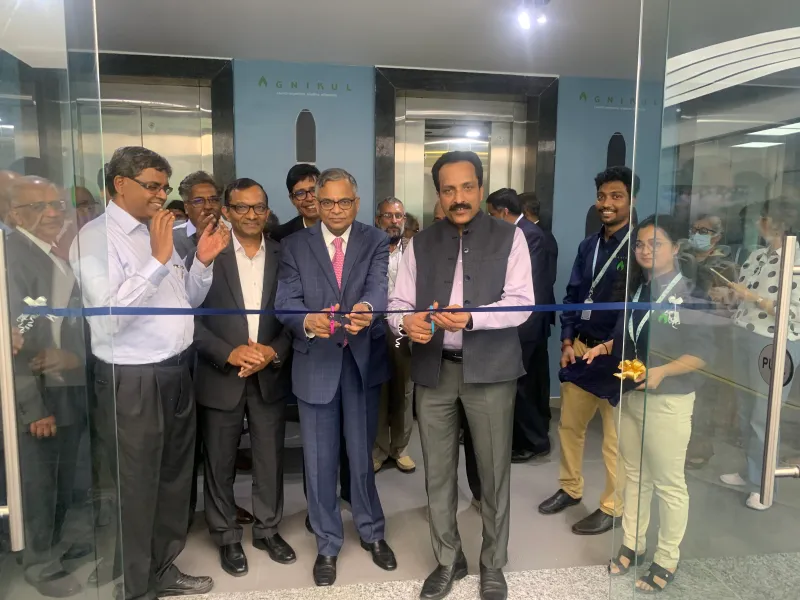Agnikul Cosmos opens its first facility dedicated to 3D-printed rocket engines
Chennai-based spacetech startup Agnikul’s latest facility marks its move from R&D and testing to production.
, a Chennai-based spacetech startup, on Wednesday inaugurated Rocket Factory – 1, which it says is India’s first such facility dedicated to making 3D-printed rocket engines at scale.
Rocket Factory – 1, situated at IIT Madras Research Park, was unveiled by N. Chandrasekaran, Chairman- TATA Sons and S Somanath, Chairman, ISRO & Secretary, Department of Space.
Launched in 2017 by Srinath Ravichandran, Moin SPM, and Prof SR Chakravarthy, Agnikul Cosmos is incubated at IIT Madras. It is building India’s first private small satellite rocket, Agnibaan, which will be capable of carrying up to 100 kilograms of payload to low Earth orbits up to 700 kilometres.
“This would help us actually go from R&D to production as we are now starting to look at making things in larger quantities,” Srinath told YourStory.
According to the startup, an entire rocket engine can be made from scratch using the 3D printer at the new facility.
“Using the machine, we aim to make at least two rocket engines a week and have plans to expand it to four engines a week,” said Srinath. “Essentially, the raw materials go in, and what comes out of this facility is a fully made rocket engine system.”
The 3D printer is from a Germany-based company called EOS. Apart from this printer, the facility has other machines that are required to make, assemble and integrate the rocket engine.

Rocket Factory – 1 unveiled by N. Chandrasekaran, Chairman- TATA Sons and S. Somanath, Chairman, ISRO & Secretary, Department of Space
USP
At its Rocket Factory – 1, Agnikul will make semi-cryogenic rocket engines, meaning they burn kerosene and liquid oxygen, which is in a cryogenic state or cold state.
“These engines are actually fully 3D printed in one shot. We have also filed for a patent on this one where the entire rocket engine has zero assembly parts involved in it. The design is being pushed to a point where the whole engine is like a single piece component,” Srinath added.
Agnikul makes two types of engines, Agnilet and Agnite.
In early 2021, Agnikul successfully test-fired the world's first single-piece, fully 3D-printed rocket engine called Agnilet. The startup showcased this engine at IAC 2021, Dubai.
The second engine is Agnite, which is the first stage engine and will be developed and manufactured in this facility. Srinath adds that there are close to seven versions of this engine in the first stage. This engine, unlike Agnilet, has not undergone testing.
This facility will also help the company bring all of its production in-house. The 3D machine at the facility will help cut production time, the startup says.
“We are able to actually move our delivery of the engine within a very short period of time with no human intervention in the process and a completely automated process,” Srinath added.
“This is a big advantage as once we start the production of a rocket engine, the rockets can also be made faster which will in turn help scale at lesser costs, in terms of production, and lesser pain for the customer as it will match their conditions much better,” he said.

Agnikul's facility in IIT Madras
Agnibaan
The startup became the first Indian company to sign an agreement with the Indian Space Research Organisation (ISRO) in December 2020. The agreement signed under the IN-SPACe initiative sanctioned Agnikul access to the Indian space agency’s expertise and facilities to build Agnibaan.
Agnibaan has the capability for a plug-and-play engine configuration that is configurable to precisely match any upcoming mission needs. These engines built in this facility will be the core for this vehicle to be launched toward the end of this year.
“We are attempting to launch later part of this year,” said Srinath. “We are working with Israel on the paperwork and all of the interface requirements required to get this to work. The target is we should be ready by the end of this year.”
Agnikul has raised a total funding of $15 million from Mayfield India, pi Ventures, Speciale Invest, and several prominent angels such as Anand Mahindra, Chairman of Mahindra Group and Naval Ravikant, American entrepreneur co-founder, chairman and former CEO of AngelList.
Edited by Affirunisa Kankudti







